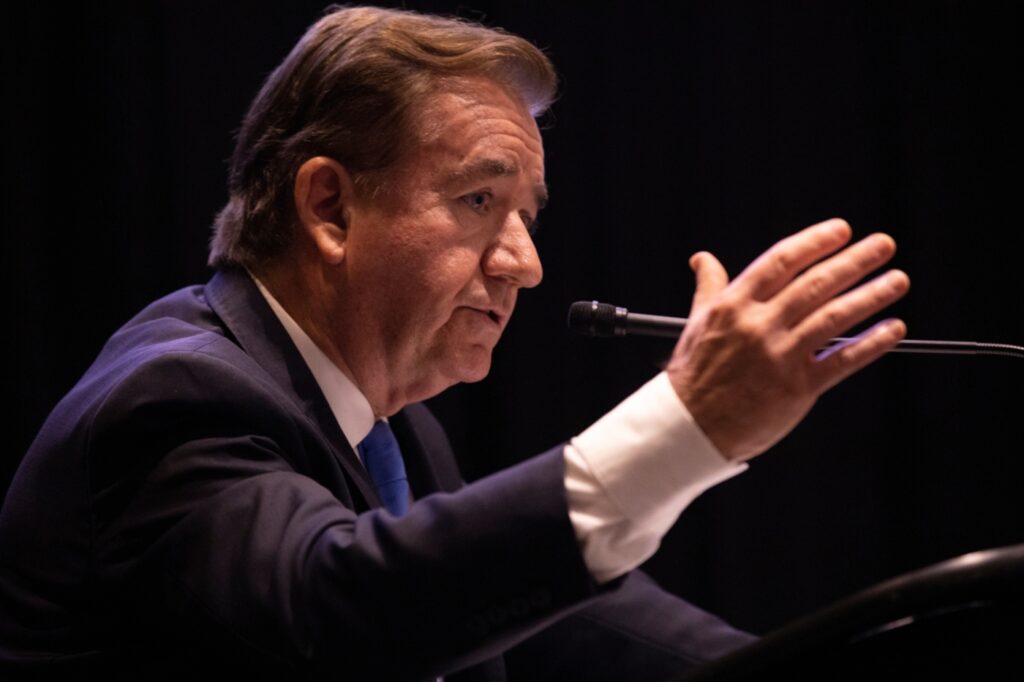
Russia’s systematic attacks on Ukraine’s civilian population are clearly “crimes against humanity,” said an expert on the law and ethics of armed conflict, who was one of the panelists at a recent symposium at Cal State University Fullerton.
As one of seven experts speaking at the Royce International Symposium on New Challenges for U.S. Foreign Policy, David Traven, assistant professor of political science at CSUF, said Russian President Vladimir must be held accountable for his actions.
The symposium, held April 5 at the Titan Student Union, addressed U.S. foreign policy challenges mainly related to China and Russia, with particular focus on the current conflict involving Russia’s attempted takeover of Ukraine.
Panelists included scholars from CSUF, UC Riverside and UC Irvine, along with national security experts from the Cato Institute and the Heritage Foundation.
When Putin’s initial plan to overthrow the Ukrainian regime failed, Russia’s leader shifted tactics to “obliterating entire cities,” including the leveling of civilian hospitals and buildings housing children, Traven said.
“At this point, there is no doubt at all about what is taking place,” Traven said. “The deeper questions have to do with what we are going to do in response to that.”
The current administration should commit publicly to defeating Russia, Tavern said.
“At the very least, militarily they need to be defeated,” the professor said. “That just has to happen. There will be no accountability at all if they are allowed to just get away.”
The symposium was organized, in part, by former Republican congressman and CSUF graduate Ed Royce, who served 13 terms representing District 39 in the U.S. House of Representatives.
Some Ukrainians have been bracing for an invasion from Russia since 2014, said Royce, who served on the U.S. House Foreign Affairs Committee and the African and Asian subcommittees while in Congress.
With the region slipping into a dictatorship, crafting a plan focusing on strategic deterrence is a necessity, Royce said.
Royce referenced legislation he helped pass in 2014 that gives the executive branch of government the authority to give long-range antitank weapons and high-altitude weapon systems that would provide U.S. allies with a “credible deterrence.”
“Now is the time,” Royce said. “Why don’t we give them the best in terms of ultra-light vehicles, in terms of drones? That is a way to demonstrate to the world that democracies can come together at least to give weapons to other democracies. We should be orchestrating this.”
Allowing Russia and China to advance their interests unimpeded could have “catastrophic” implications for the free world, said James Jay Carafano, vice president of national security and foreign policy for the Heritage Foundation.
“The U.S. way of living is completely opposite to the ways of Russia and China,” said Carafano, who was the keynote speaker at the symposium. “I think we are in one of the most eventful and impactful moments in modern times.”
The most difficult and consequential policy decisions center around energy, Carafano said.
“Does the U.S. rely on its adversaries for energy resources, or does the country put in place an aggressive plan for climate action that looks at a rapid transition to renewables?” Carafano said. “We cannot do both. We have to make some very hard decisions.”
Eric Gomez, director of defense policy studies at the Cato Institute, presented images from U.S. satellites showing missile silos being constructed in China.
This apparent increase in China’s nuclear arsenal can be viewed a number of ways, Gomez said.
“It could be that China is simply growing their arsenal to meet the threat and use it as a preventative force against the U.S., or you can view it much more negatively to say that China is now developing the technical capacity to adopt a much more aggressive nuclear strategy and/or a more aggressive conventional military strategy.”
The U.S. should engage China on the topic of arms control, but the deteriorating relationship between the two powers makes that difficult, Gomez said.
Alexei Shevchenko, a CSUF professor of political science and researcher of American foreign policy and Russian and Chinese foreign policy, said Russia is transitioning to a revisionist state and is willing to take risks to achieve that goal.
“I see a push from Russia and China to rethink the structure of international politics and switch from a rules-based order into something akin to the 19th century … great powers carving the world into spheres of influence.”
Russia’s strategy is dangerous, Shevchenko said, but the good news is that Putin’s plan has “misfired,” giving the U.S. reasons for optimism.
Heidi Hardt, assistant professor of political science at UC Irvine, said the U.S. needs to understand the implications of a nuclear power invading a sovereign state.
But any policy decisions should start by addressing the human toll of the atrocities occurring in Ukraine, said Hardt, who is on sabbatical from teaching as she works at the State Department on the Council of Foreign Affairs.
“We are truly at a critical juncture right now for U.S. foreign policy,” Hardt said. “I think we recognize the severity of this invasion. I think it’s important to start with the human element of these atrocities.”
Related Articles
Hard work, spirituality, familial support are keys to resiliency in APIDA community, experts say
Tennis is therapy for Ukrainian student far from home and family
Army Special Ops ‘Black Daggers’ descend over Cal State Fullerton
Titan Capital Management team notches 3rd straight win in financial analyst competition
In-person workshops and events return to Fullerton Arboretum with spring
